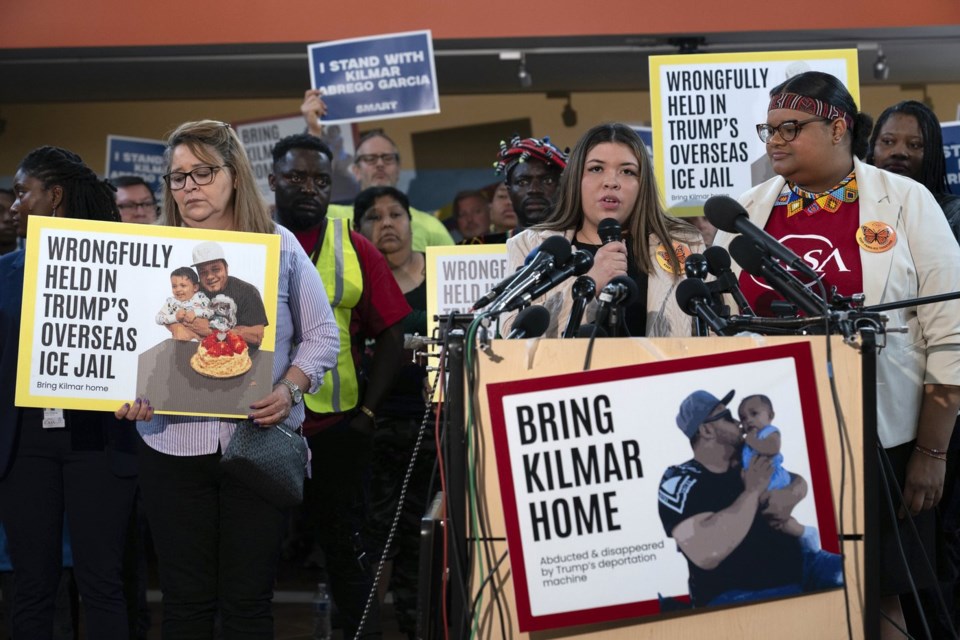GREENBELT, Md. (AP) — A federal judge said Tuesday that she will order sworn testimony by Trump administration officials to determine if they complied with her orders to facilitate the return of Kilmar Abrego Garcia, who was mistakenly deported to a notorious El Salvador prison.
U.S. District Judge Paula Xinis in Maryland issued her order after Trump officials continually refused to retrieve Abrego Garcia, saying they defied a “clear” Supreme Court order.
She also disregarded Monday's comments by White House officials and El Salvador's president that they were unable to bring back Abrego Garcia, describing their statements as “two very misguided ships passing in the night.”
“The Supreme Court has spoken,” Xinis said, adding that what was said in the Oval Office on Monday “is not before the court.”
Xinis said she will call for the testimony of government officials, including Robert Cerna, the acting field office director for the U.S. Immigration and Customs Enforcement. She expects the process to last about two weeks.
"The bottom line is it was a very simple directive,” Xinis said of her own order for the U.S. to return Abrego Garcia. “I’ve got nothing. I’ve got no real response.”
The hearing came a day after White House advisers repeated the claim that they lack the authority to bring back the Salvadoran national from his native country. The president of El Salvador also said Monday that he would not return Abrego Garcia, likening it to smuggling “a terrorist into the United States.”
Abrego Garcia’s deportation has become a flashpoint as President Donald Trump follows up on campaign promises of mass deportations, including to an El Salvador prison. Following Tuesday's hearing, a crowd outside the federal court house in Maryland chanted, “What do we want? Due process. When do want it? Now!"
An attorney for Abrego Garcia said contempt proceedings could be the logical next step after the discovery phase. “This is still a win, and this is still progress," Rina Ghandi said. “We’re not done yet, though.”
Abrego Garcia's wife, Jennifer Vasquez Sura, said shortly before Tuesday's hearing that he was working hard to achieve the American dream for his family.
“That dream was shattered on March 12th when he was abducted and disappeared by the United States government in front of our 5-year-old-child,” she said. “Today is 34 days after his disappearance ... I will not stop fighting until I see my husband alive.”
Abrego Garcia, 29, lived in the U.S. for roughly 14 years, during which he worked construction, got married and was raising three children with disabilities, according to court records.
A U.S. immigration judge had shielded Abrego Garcia from deportation to El Salvador in 2019, ruling that he would likely face persecution there by local gangs that had terrorized his family. He also was given a federal permit to work in the United States, where he was a metal worker and union member, according to Abrego Garcia’s lawyers.
But the Trump administration expelled Abrego Garcia to El Salvador last month anyway. Administration officials later described the mistake as “an administrative error” but insisted that Abrego Garcia was a member of the MS-13 gang in Long Island, New York, where he has never lived.
Abrego Garcia was never charged with a crime and has denied the allegations.
Xinis had ordered the Trump administration in early April to bring Abrego Garcia back. And the U.S. Supreme Court agreed last week that the U.S. government must “facilitate” Abrego Garcia’s release.
But the White House has balked at trying to broker his return, arguing the courts can’t intrude on the president’s diplomacy powers.
Xinis ordered the U.S. last week to provide daily status updates on plans to return Abrego Garcia. The Trump administration responded the next day, saying that he was alive in the El Salvador prison. But it has only doubled down on its decision not to tell a federal court whether it has any plans to repatriate Abrego Garcia.
In a filing Tuesday afternoon, Trump administration attorneys said the government is prepared to facilitate his return. But they said that his protection from being deported to El Salvador would be removed, and that he could be deported back to El Salvador or to a third country, they said.
In a court filing on Tuesday, Abrego Garcia's lawyers rejected the idea that the U.S. lacks the authority to retrieve him. They noted that the U.S. is paying El Salvador to hold prisoners, including Abrego Garcia, and “can exercise those same contractual rights to request their release.”
Bukele struck a deal under which the U.S. will pay about $6 million for El Salvador to imprison Venezuelan immigrants for a year. Trump has said openly that he would also favor El Salvador taking custody of American citizens who have committed violent crimes, which is likely illegal.
Michael Kunzelman And Ben Finley, The Associated Press



